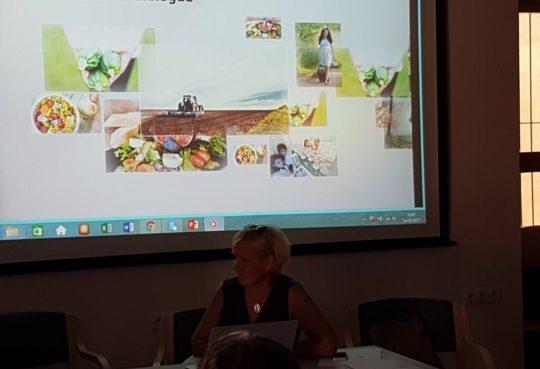The urgent need to address reduction in small farm holdings was one of the subjects that provoked discussion at the international meeting on Food, Gastronomy and Tourism: social and cultural perspectives. In association with the UNESCO Chair on Food, Culture and Development, Universitat Oberta de Catalunya (UOC), the Laboratori de Patrimoni, Creativitat i Turisme Cultural (LABPACT), University of Barcelona/Ibertur, with the collaboration of Tossa de Mar City Council, TossaLab, and the Chair on Culture, Gastronomy ant Tourism Calonge-Sant Antoni-University of Girona, the 44th international conference of the International Commission on the Anthropology of Food and Nutrition (ICAF) took place, 25 – 27 May in Tossa de Mar, Catalonia.
The International conference brought together current, mainly anthropological, but also interdisciplinary perspectives on tourism and gastronomy strongly linked to the local territories, which created a useful space for the analysis and discussion of gastronomies and tourism within the body of the social, cultural, political, geographical or socioeconomic perspectives on food, investigating and informing discussions from the relationship between gastronomy and tourism to the sensory experiences in the field.
Dr. Diane Dodd, President of the International Institute of Gastronomy, Culture, Arts and Tourism – IGCAT – opened the conference with an introduction of the European Region of Gastronomy concept which was applauded by the attendants for its innovative cross-sectorial approach. She noted that while steps are being taken to address and support cultural and food diversity that it is not nearly enough. She noted that «society is at a critical juncture and urgent policies are needed to make farming an attractive career option.» She also spoke about the need to bring gardening, cookery and creative classes back into education as well as policies to address food waste. Prof. Xavier Medina noted that the opening address given by Diane Dodd, underlined many of the key questions that the conference hoped to address and panelists used it as a reference when discussing subjects as diverse as, building a gastronomic identity, the role and relations in farmers markets and the need to support cultural and food diversity.
The Regions of Gastronomy Platform and the European Region of Gastronomy Award aim to contribute to better quality of life in European regions, by highlighting distinctive food cultures, educating for better health and sustainability and stimulating gastronomic innovation. Candidate regions are invited to join a knowledge-exchange platform of European regions in order to further cross-border collaborations and develop shared initiatives.
IGCAT (International Institute of Gastronomy, Culture, Arts and Tourism) is the coordinating body of the Platform and organises the award with the support of European institutions. IGCAT is an international network of experts that aim to guide, facilitate and support leaders in cities, regions and cultural projects to understand the potential of their distinct food, culture, arts and sustainable tourism assets.
Contact: info@igcat.org
www.igcat.org
29 mayo 2017
